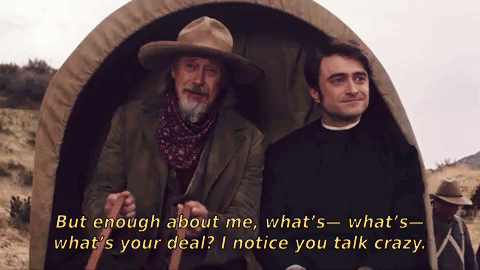Community Bulletin
The raft of life
I want to float an idea to you all that’s been running around in my head lately.
I’ve mentioned before that the first couple of years of The Writers Panel were held at the old Meltdown Comics/Nerdist performance space. It was so gratifying seeing many of the same faces—new writers, folks who’d just arrived in LA—showing up, asking questions, and forming their own community.
I wrote about networking over on Mickey Fisher’s newsletter, and this is kind of about that, but mostly it’s about creating a community.
I’ve gotten the opportunity in the past few months to read and meet some of you through the “get notes and an hour-long Zoom” subscription tier.
I’ve been really impressed with what I’ve read by you all so far, and even more impressed by the Zoom calls we’ve had. To a person, you’ve been eager and enthusiastic about receiving feedback and, the best part, brainstorming solutions.
Group, Think
A few of you have asked about finding a writers’ group. The short answer is that I don’t know. The few writers’ groups of which I’ve been a part have come together somewhat naturally, among friends.
But writers’ groups, or any kind of cohort that gets together to support and give feedback, is important. As Cindy Fang (Young Rock) said when she appeared on the podcast, “to have a group of like-minded people who are going to push you to meet a goal is just super helpful.”
“I think it’s invaluable,” Glen Mazzara told me the first time he appeared on the podcast. Glen was the showrunner of The Walking Dead, Damien, and the scuttled Dark Tower series. “When you're in a writers group,” Mazzara says, “you're reading someone's material, and you're trying to get ahead of what they're doing.”
You're looking at what their intention is, and then how you can be helpful. You're offering help to that person: “here's your vision, I think it got a little cloudy here, here's something I'm offering.”
That's what you do in a writers room. You're there to generate ideas, you're there to think about what the showrunner is doing, what do they like, what don't they like, and get ahead of them so that you can give a pitch that they feel they can write. Because they're the best writer on the staff. Because that's what they are told.
So you see what I'm saying? You're just trying to generate a great idea that someone else is going to take credit for. That's sort of how it works in writers’ groups, but it's a lot nicer. It's valuable. It's a skill that you develop. And you want to develop these skills ahead of time so you can hit the ground running when you're in a writers room.
So, being in a writers’ group is beneficial to both you and the group. You develop the skills that Mazzara describes while also helping others with their material.
I like how Mrs. America creator Dhavi Waller (Halt and Catch Fire; Mad Men) frames the connection between writers’ groups and networking: “I always think of networking as: what do I have to offer and how can I help people? Rather than: what can I get out of people? …So, you offer to give notes to your friends who are writers. You offer to be a sounding board. I think just being helpful and seeing yourself as part of a community is a great way to think about networking.”
Communication Studies
How do you find that community? Twitter used to be a good way to find other pre-WGA writers, but that place is no fun anymore.
There are classes, of course, and I’ve encouraged my Script Anatomy students to stay in touch with each other and give each other notes even after the regular classes end, and I hope they have.
"The sketch community was a really wonderful training ground for me,” says Taylor Cox (Girls5Eva; Miracle Workers). Cox was “new to writing” and had recently arrived in LA and was “up against people who had gotten to go to film schools and who had, you know, known about this industry and grown up in L.A. and had been writing scripts since they were children.”
Meanwhile, I had Microsoft Word and was like, “Is this what a script is supposed to look like?” I really had no idea.
So the sketch world was a really wonderful place for me to go. First of all, to hone in on things like structure and, in comedy, like little things like learning what the “rule of threes” was.
Honestly, though, it was just getting to put things on their feet in a safe space. There's something to be said about having a place where you feel safe to just put up a million things until finally something gets a laugh, and then you can learn why that got a laugh.
Abdi Nazemian (Ordinary Joe) says, “When I was younger, we would do script readings. We invited actor friends or writer friends. Everybody would read it and you'd feed them and people would hopefully laugh or have interesting things to say, but it would give a sense of of community.”
Really, he says, it’s about finding “organic ways to create community around your writing.”
So, to that end:
The folks who subscribe to and read this newsletter, especially those of you who show up to and ask questions at the Q&A’s, are smart, passionate, creative, and really very nice people. You should meet each other.
I can’t think of anyone who’d make a better writing group than you all. And I’m going to call out some of you whom I’ve read already: Nicole, Rick, Manolo, Bobbi, Melissa… come on! Bring in some of those folks who’ve attended the Q&A’s.
Leave a comment below if you’re interested, and I’ll do what I can to help connect you.
Drinking Buddies
In the years before lockdown, and then again since last year, I’ve been putting together drinks-gatherings for guests of The Writers Panel. They’ve been a really fun way for folks to meet writers they didn’t know before, reconnect with those they did, trade stories and gossip, commiserate and celebrate.
I’d like to do that for subscribers of this newsletter. There are a lot of you based in LA, and I think it’d be a good opportunity to meet each other in person.
Is an LA-based get-together for paid subscribers of interest to you? Again:
‘Stack It Up
Finally, I’ve really loved the (for-now) tiny community of pro writers who are doing these newsletters. I’m lucky enough to already know some of these folks, and luckier still to make friends with some through our Substacks. There aren’t, as yet, a ton of newsletters about TV and film writing, about the process or business. But the ones that do exist are really good! I’ve linked to a few on the landing page (under “Recommendations”), but I want to direct you to a few recent articles by my peers that I found really helpful or inspiring:
Ali Vingiano’s newsletter about finding an agent or manager—and whether you even need one—is reason enough to become a paid subscriber to Little Things.
Andy Bobrow and the gang at In the Trenches consistently put out terrific dissections of the up-to-the-minute concerns of working writers, from their deep dive into the gains of the 2007-8 strike to their surprising conversation about why everything “takes for-fucking-ever these days.”
Marc Guggenheim put out a heartfelt entry in his LegalDispatch newsletter about some personal work frustrations that, believe me, are universal.
Eden Dranger, in Not So Starving Artist, offers good, practical advice about financial matters for those in creative professions. Her piece on aging parents is helpful, heartwarming, and, because Eden is a great comedy writer, really funny.







Look at me, mom! I’m in the newsletter! 😆 Very interested in both meeting and drinking. I swear it is on my todo list to “contact Ben B. Re: meeting up with others in the group”
Yes please, I’d love to do a meetup